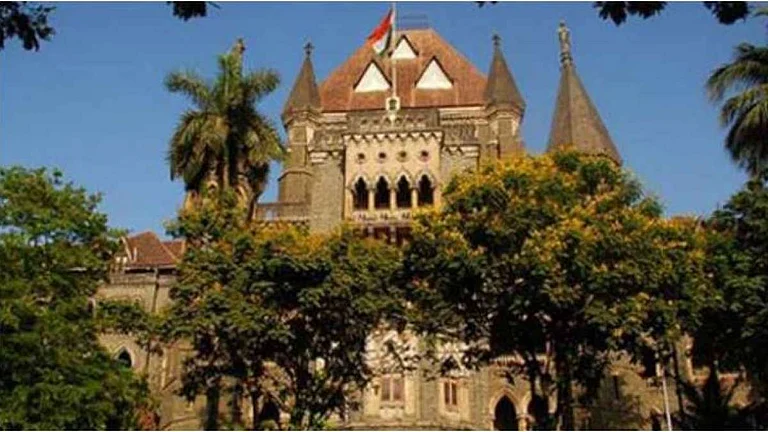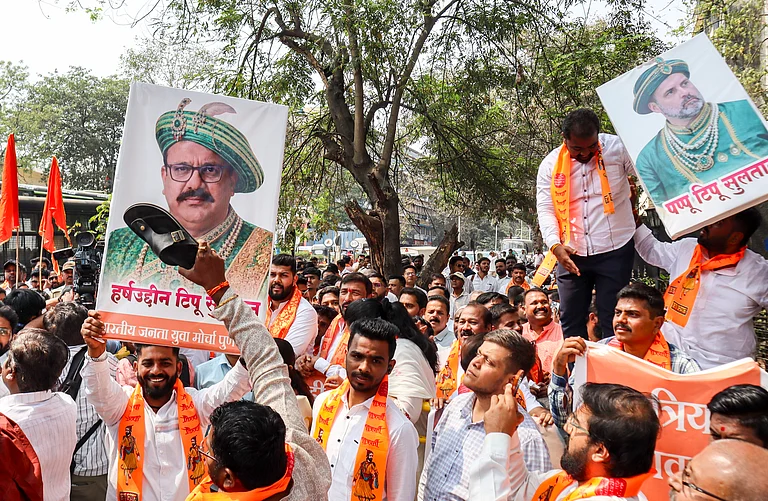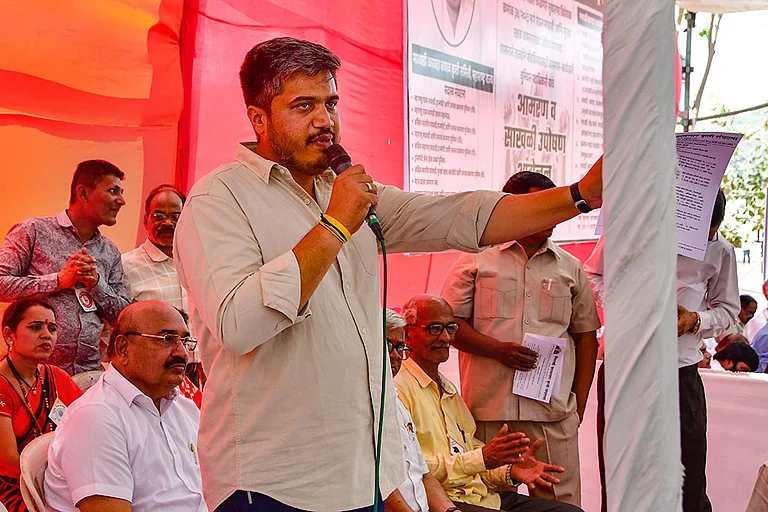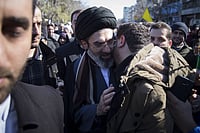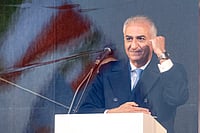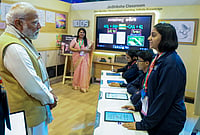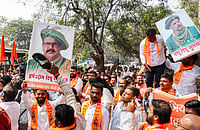For Bassim*, offering daily namaz at Sunehari Masjid in Paud now comes with precautions. As a long-time resident of the village, he has served as the Masjid trustee for years. However, since May 2, his daily routine of opening the mosque's doors comes with caution, however minuscule.
He says, “Earlier, about 200 to 250 people would come for prayers. The entire lane used to be filled with shoes till the very end. People who weren’t residents of Paud also used to be in attendance."
Now, just 20 people come to observe the namaz.
On May 2, a teenage Muslim boy had entered a local Nageshwar temple in the village and was caught desecrating the idol of Annapurna Goddess on CCTV.
The boy was not a local.
Despite being born in Paud, the boy was considered an “outsider” as his family had descended from Bihar and were renting a house in the village. For his crime, the local police arrested his father and Sunehari Masjid’s then maulvi. The localities claimed that the maulvi played a role in influencing and instigating the boy to perform the act.
Since the crime, Paud, which had been an unremarkable village in the past, came into the limelight for escalating tensions between the locals and the Muslim community, especially those who were ‘non-residents’.
Hindu right-wing bodies organised a bandh along with a march condemning the act.
Angry mobs in the village had threatened the Muslim community to leave their business and leave Paud. Notably, prominent Muslim businesses in the area, Sangam Bakery, Roshan Bakery and New Bharat Bakery, had closed shop.
Two months have passed since this incident, and the local Muslim and Hindu families agree that the situation is returning back to normalcy. New Bharat Bakery has already opened its doors; however, the Muslim employee who used to run the small shop had been chased out, claimed the owner’s nephew, who now runs the shop.
He says if the employee chooses to return from Pune, he can run the shop again.
Meanwhile, the Sangam Bakery, which has been running since 2007 by generations of a local Muslim family, remains closed for business. Senior Inspector Santosh Girigosavi claimed that the bakery’s business will resume from May 13. However, the owners of Sangam Bakery remain out of contact and have fled Paud, according to locals.

Carrying a log book with him as he unlocked the gates of the mosque, Bassim* explained that he had been instructed to register the names and contact details of the non-locals who come and attend prayer. He has been maintaining this register for the better part of the last two months. He claims that every person who comes to the mosque must be accounted for to avoid a recurrence of the incident of May 2.
Bassim* had to get police approval on the new maulvi for Sunehari Masjid. With his logbook, Bassim* carries the police approved letter with personal details of the maulvi who comes from Pune to conduct prayers in Paud.

While Bassim, too, believes that peace is back in the village, he still feels hostilities towards “outsiders” residing in Paud.
A fact-finding research team from People's Union for Civil Liberties (PUCL) revealed the extent to which the insider-outsider tension had grown in Paud. The team found out that boards displaying a notice banning the entry of "Muslims not residing in the village" were illegally placed around by the Graham Sabha.
Some of these posters were put up in the vicinity of the mosque. The existence of such display boards added to the atmosphere of constant fear and insecurity, reported the PUCL.
The team had also reported that a “boycott” had been launched by certain influential people from outside the village that PUCL had identified and reported to the police. A mob of certain local people and some from outside the village were reported to be frequenting the area and threatening people not to allow Muslims to take up labour or residence in Paud.
PUCL reported their findings in a letter addressed to the Chief Secretary of Maharashtra, the District Collector of Pune, the Divisional Commissioner of Pune, MP Supriya Sule and Ajit Pawar.
Milind Champanerkar, the General Secretary of PUCL, Pune, explained that after continuous convincing and presenting of evidence to the police, some actions were taken to de-escalate the situation in the region.
While the letters have yet to receive a response, Supriya Sule did take action based on the PUCL's reports, which gained media coverage and ordered the illegal posters and boards to be taken down by the police, Champanerkar.
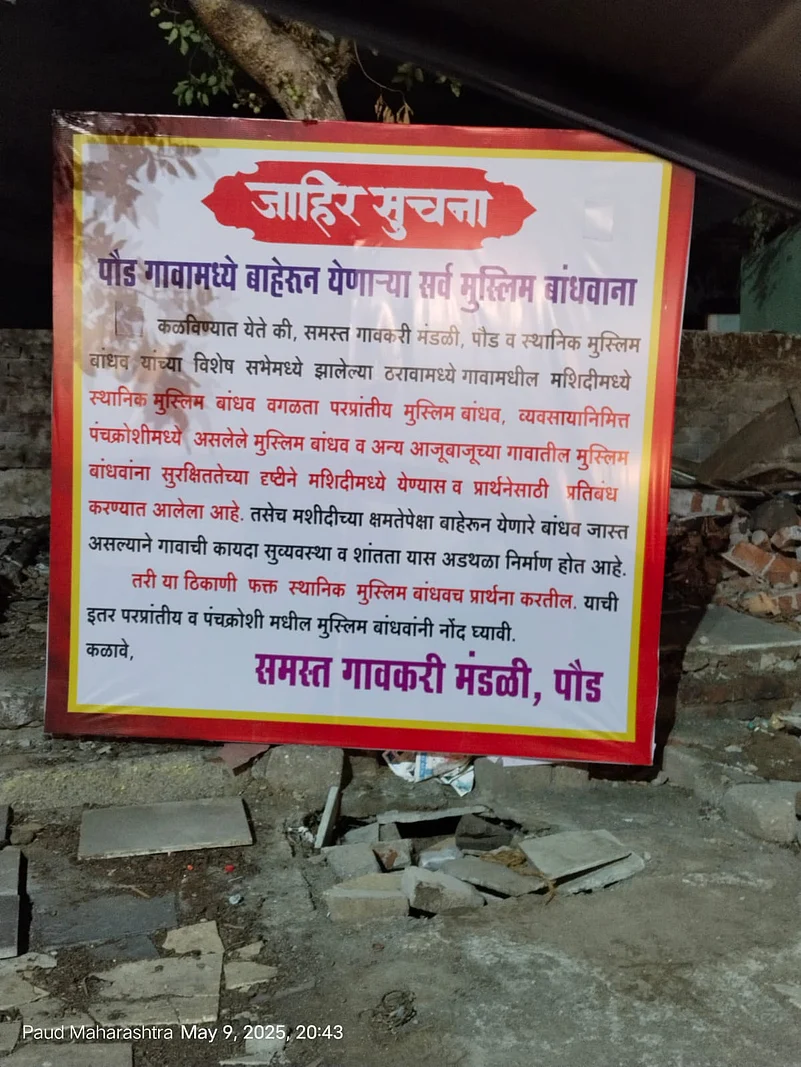
Senior Inspector Girigosavi of the Paud police has been taking measures to maintain peace. He has been conducting daily meetings in batches with locals of both communities and Muslim business owners.
In these meetings, the people raise their concerns to the police and are briefed on how to conduct or reopen their businesses post-May 2 incident.
The Senior Inspector admitted that at the time of the incident, "emotions were running high" in the village, especially in the aftermath of the April 22 Pahalgam attack. He called it a case of "bad timing", indicating that the incident wouldn’t have been blown up by the media to the extent it had been if it had occurred at any other time.
He claimed that this wasn’t the first time that the temple was disrespected. Idols had been vandalised in the temple twice before May 2. Due to the recurrence, the police had installed a CCTV system in the temple, which had no attending priest or security otherwise.
When asked about the Muslim businesses that had been forced to shut down, Grirgosavi said, “Due to the pressure at that time, many of the non-resident Muslims left the village to either pick up work elsewhere or to reside with their relatives until the situation calmed down.” He emphasised this was about those Muslims who were non-localites and had picked up small jobs around Paud.
“Even the three businesses that were majorly impacted by the tension in the village are due to open soon,” he said, referring to the Muslim-run bakeries. “One has moved to a different location, another has said they are using this time for renovation, and lastly, Sangam Bakery is due to open on July 13.”
He added that smaller Muslim-run businesses such as the milk service, salons and butcheries have also begun operations.
Girigosavi claimed that in his meetings with the locals of both communities, he explained Article 19 of the Indian Constitution to them, which guarantees the six fundamental freedoms.
“We explained to the people what is in the law,” he said regarding the illegal posters and the boycott of ‘outsider’ Muslims, “any Indian citizen in India has the right to reside and take up work anywhere in India, no matter their religion.”
Even though the Senior Inspector claims that peace and normalcy have returned to the village, the local Hindu and Muslim communities have confirmed that daily meetings with the police are still being conducted two months on as a precautionary measure.
PUCL poses the question, “Can a whole community living in a village be made to suffer for an offence allegedly committed by a boy belonging to their community?”
In their thorough investigation, they found out that casual labourers and employees who are Muslim had been allowed to work in Paud for nearly a month and a half since the incident. This "boycotting" led to the severe loss of income, subsequently creating "an acute problem of survival" for the Muslim labourers.
The incident even affected Hindu employers who had been threatened for contracting Muslim ‘outsiders’ as employees.
Miland Champanerkar of PUCL, Pune, says that while the police have played their part to try and restore peace, “ a lot is yet to be done.”
Champanerkar claimed that the issue in Paud is being replicated across other villages in Maharashtra, such as Kolapur and Nanded as well. The insider-outsider tensions have slowly been rising in rural Maharashtra, as those who cannot find employment in main cities such as Pune choose to migrate in masses to villages like Paud.
Highlighting a major issue, Champanekar states, “ The locals will label these migrated people as “outsiders”. Yes, some of the labourers have migrated from places outside Maharashtra, but the problem comes when these people have lived for three or so generations in the village and are still called “outsiders”. How can a person who has lived for years in a place still be considered an outsider?”
Champanekar stresses that this situation has become a “new normal” in Maharashtra. Thanks to the efforts of the PUCL, the Muslim community, which was earlier too afraid to even speak out on their situation, has been able to open up their shops again.
Champanekar has told the Muslim locals to “not be naive” in their return and ask for police protection until they are completely confident.
Even though the localities and police claim that life is back to normal at Paud, PUCL’s Champanker says, “It is not over until everyone who fled returns to the village.”
The PUCL has raised concerns about this developing situation in Maharashtra to the state authorities, but has yet to receive any response.
*Certain names have been changed on request.








